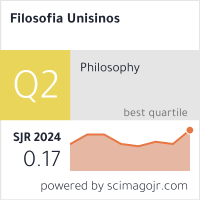Wearable Robots in rehabilitative therapy: A step towards transhumanism or an ecological support?
DOI:
https://doi.org/10.4013/fsu.2016.172.03Resumen
In the present paper we want to argue that Wearable Robots (i.e., technological devices used to restore the possibility of walking and re-establishing “normal” human life) should not necessarily be anthropomorphic, in order to respect human autonomy, freedom, and nature. Moreover, we argue that this non-anthropomorphism does not necessarily lead to transhumanism. To adequately discuss this topic, we are called to consider various aspects embedded in the question: the difference between restoring and enhancing, i.e., the difference between considering human nature as normative, or will (or wish) as the main criterion of choice; the difference between exceeding the limits of human nature (i.e., human enhancement) and restoring human functions; and, finally, the nature of the function itself. We will introduce a “weak” notion of autonomy and freedom, dealing with rehabilitation and motility, in order to assess the use of Wearable Robots in rehabilitative medicine. Hence we will argue that the less constraints that patients have, the freer they are. All these aspects also imply an anthropological and ecological view, since they have to do with the relationship of the human being with its environment.
Keywords: human ecology, Wearable Robots, Transhumanism, anthropomorphism, Arne Næss, environment.
Descargas
Métricas
Descargas
Publicado
Cómo citar
Número
Sección
Licencia
Concedo a revista Filosofia Unisinos – Unisinos Journal of Philosophy o direito de primeira publicação da versão revisada do meu artigo, licenciado sob a Licença Creative Commons Attribution 4.0 (que permite o compartilhamento do trabalho com reconhecimento da autoria e publicação inicial nesta revista).
Afirmo ainda que meu artigo não está sendo submetido a outra publicação e não foi publicado na íntegra em outro periódico e assumo total responsabilidade por sua originalidade, podendo incidir sobre mim eventuais encargos decorrentes de reivindicação, por parte de terceiros, em relação à autoria do mesmo.










